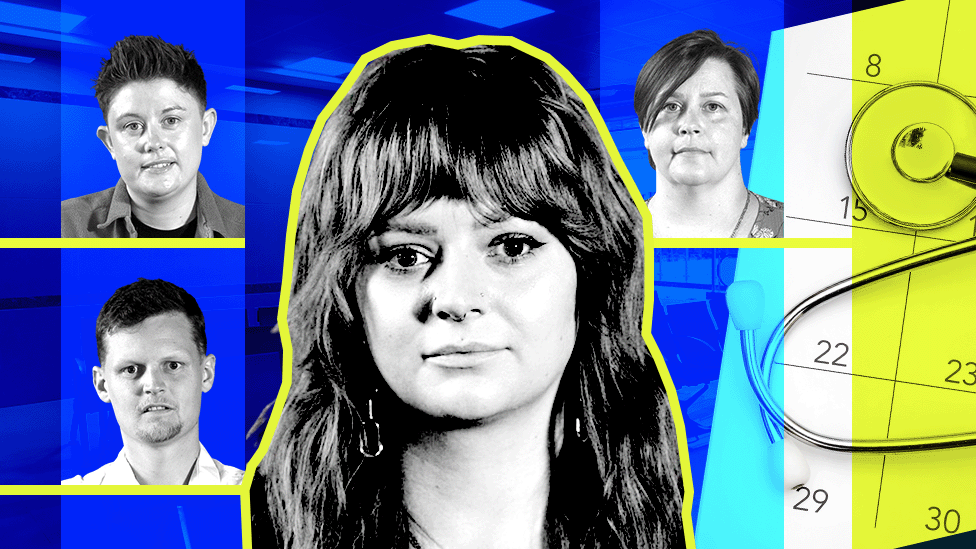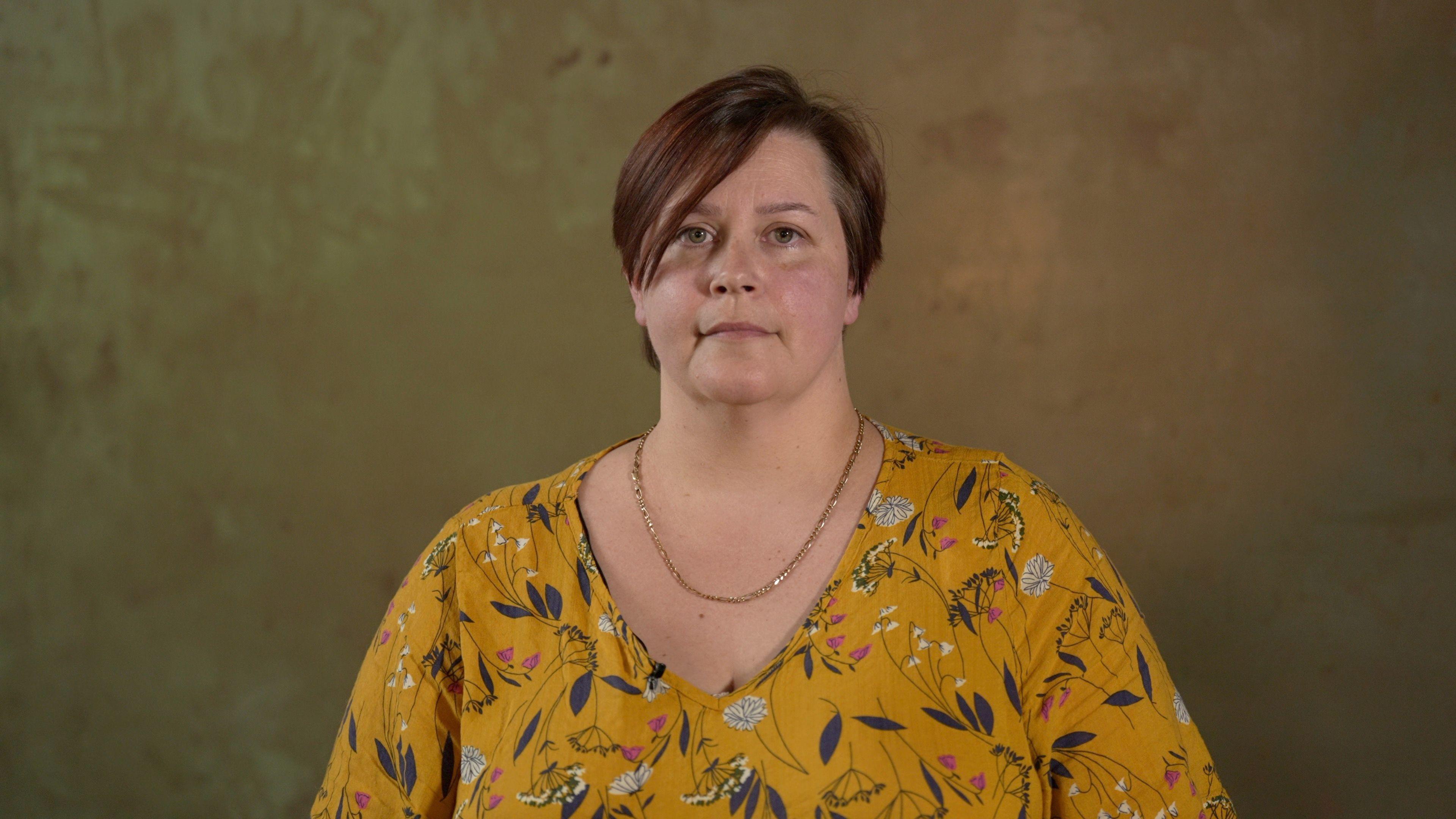Eight-year ADHD backlog at NHS clinics revealed

- Published
Many areas of the UK have such long backlogs for adult ADHD assessments that it would take at least eight years to clear them, a BBC investigation has found.
Based on Freedom of Information requests, it appears about half of services have long waits on that scale based on how quickly they are currently seeing patients.
The investigation, which focused on adults and not children, suggests there are at least 196,000 adults on waiting lists across the UK.
The Royal College of Psychiatrists said no-one should be made to wait years for life-changing care.
Taking risks
ADHD (attention deficit hyperactivity disorder) is a condition that affects people’s behaviour - making it harder to concentrate and manage time. Acting impulsively and taking risks can also be an issue.
People are only diagnosed if the symptoms cause at least a moderate impact on their lives.
The government said delays to ADHD diagnosis are part of a “broken NHS” - which it is working to fix.
The long waits have been caused by rising demand - referrals have increased fourfold since 2019 - and limited capacity, with three trusts having closed their waiting lists completely.
One trust, Sheffield Health and Social Care NHS Trust, has a waiting list of more than 6,000 people and assessed only three patients last year.
The BBC has spoken to people caught up in the long waits in that area.
NHS cannot meet autism or ADHD demand, report says
- Published4 April 2024
Waits 'devastating'

Louise is still waiting for an assessment in Sheffield
Louise Nichols has been waiting for two years. When told about the figures the BBC had obtained about waits in Sheffield, she said she was “speechless” and described it as devastating.
“Feasibly, it’s not going to happen - I’m not going to get an assessment,” she said.
Katie Drinkwater ended up paying for a private diagnosis after struggling with symptoms since childhood. At one point she thought she was going to fail her degree in health and social care because of it.
Suicidal impulses are not generally seen as an ADHD symptom. However, Katie struggled with her mental health when she was on the waiting list.
“I personally tried to take my own life twice before I got my diagnosis, because of the stress and trauma of having to navigate a world that I didn't understand,” she says.

Katie says she struggled at secondary school and nearly failed her degree
Katie says a diagnosis has made a huge difference to her.
This reflects that ADHD is treatable, with medicine and therapy. The drugs, mostly stimulants, increase activity in the brain, especially the parts which control attention and behaviour.
Therapy focuses on giving people the skills to live with the condition, to build coping strategies.
Rob Reiss and Nelly Naylor opted for another approach in their bid to get seen.
Patients have a legal right in cases where they face long waits to ask for another service to assess them.
It took Rob a couple of months to be seen and Nelly just over a year.
Nelly describes it as “life-changing” and says it has validated her “entire life and existence”. Rob says he has stopped criticising himself and is more productive.
The Sheffield trust's executive medical director, Dr Helen Crimlisk, said: “We are sorry that we have not been providing a good enough service to people seeking help for ADHD. We have prioritised treating people with a valid assessment instead of carrying out new assessments.”
People are also seen for ADHD assessment in community services and primary care, she added. The trust was not able to provide data confirming this.
Eight-year backlogs
There is no official list of adult ADHD service providers in the UK, but the BBC understands there are 70. Sixty-six responded to our request for information.
Data on how long people are waiting to be assessed for ADHD is not centrally recorded. BBC Verify calculated the backlogs using data from 44 trusts and health boards who told us about both their waiting lists and how many assessments they carried out in 2023. In 24 services it would take eight years or more to clear their backlogs.
The figures suggest only two trusts would take less than a year to see all the patients on their waiting list. They are Blackpool Teaching Hospitals NHS Foundation Trust and North East London NHS Foundation Trust, who both told us they have about 500 patients waiting to be assessed.
Some 53 services gave data on the numbers waiting – meaning the 196,000 on waiting lists is an underestimate of the total number across the UK.
'In distress'
Thea Stein, chief executive of health think tank the Nuffield Trust, said she has never seen anything like the growth of demand for ADHD services.
She argues thousands and thousands of people are waiting “in distress”, so it is time for a radical solution.
“We’re seeing more people than ever seeking support from ADHD services which are struggling to meet this demand,” the Royal College of Psychiatrists told the BBC.
All four governments in the UK say they are working to improve matters.
And NHS England said it has “launched an independent expert taskforce which will investigate the challenges facing ADHD services and help them manage the rising numbers of referrals.”
In the meantime, there is no clear solution.
The BBC has spoken to several NHS trusts. Most did not want to go on the record, but some suggest GPs could take over assessing and treating ADHD - something to which the Royal College of GPs is firmly opposed.
“The answer can’t be to shift these patients back to general practice,” it said.
Additional reporting Elena Bailey
Get in touch
Are you waiting for an ADHD assessment? How have you been affected by the issues in this story?
About the data
The BBC gathered the data using FOI requests to NHS trusts and health boards across the UK, mostly in late March 2024.
There is no central list of organisations that provide adult ADHD assessments for the NHS in England. After searching trust websites (apart from those that obviously did not run services, such as ambulance trusts), or contacting press offices, the BBC sent FOIs to 112 providers where it was either confirmed they did run a service - or where it was unclear.
Of these:
66 confirmed they ran adult ADHD services, and provided data
Four did not respond
53 gave figures for the number of patients on their waiting list, as of the latest data available. This period was not consistent across trusts
45 gave figures on the number of assessments given in 2023
44 gave figures for both their waiting list and the number of assessments given in 2023
The backlog calculated using the number of assessments and the waiting list by trust is theoretical. It does not indicate how long patients will have to wait in each area, but does illustrate the scale of the pressures faced by NHS services.